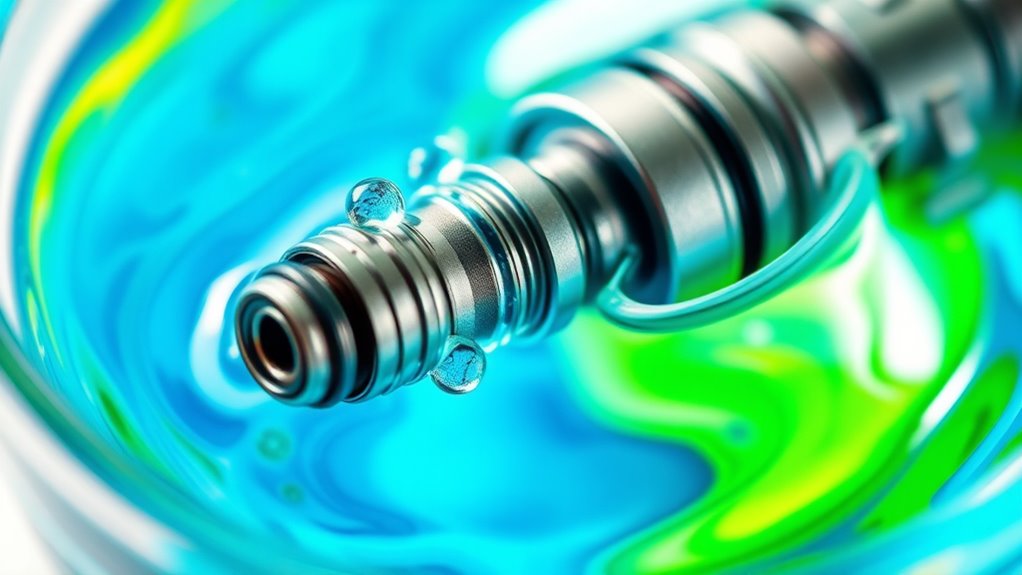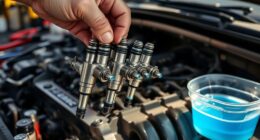Fuel system cleaners work through a mix of carefully balanced solvents, detergents, and additives that dissolve and loosen carbon deposits, varnish, and gum buildup inside your engine. These chemicals emulsify and carry away deposits during combustion, helping your engine run more efficiently. Proper formulations prevent damage and improve performance, ensuring long-term protection for your engine parts. Learn more about how these advanced mixtures maintain your engine’s health and optimize fuel efficiency.
Key Takeaways
- Fuel system cleaners contain solvents that dissolve stubborn carbon deposits and varnish inside engine components.
- Detergents emulsify loosened deposits, helping remove them during combustion for improved engine efficiency.
- Additives like corrosion inhibitors protect metal parts from rust and damage during the cleaning process.
- Proper formulation balances cleaning strength with engine safety, preventing potential damage to components.
- The chemical composition and balance of ingredients directly influence the cleaner’s effectiveness and engine performance.

Fuel system cleaners are essential products that help keep your vehicle’s engine running smoothly by removing deposits and buildup from fuel injectors, carburetors, and intake valves. These cleaners work because of their carefully formulated chemical composition, which directly impacts fuel additive effectiveness. When you add a fuel system cleaner to your tank, you’re introducing a blend of chemicals designed to break down stubborn deposits that accumulate over time. These deposits can hinder fuel flow, reduce combustion efficiency, and cause your engine to run rough or inefficiently. The key to their success lies in understanding how their chemical makeup interacts with these deposits to restore ideal performance.
Fuel system cleaners effectively remove deposits through carefully formulated chemical compositions.
The chemical composition of fuel system cleaners typically includes solvents, detergents, and sometimes additives that prevent new buildup. Solvents are the primary agents responsible for dissolving and loosening carbon deposits, varnish, and gum that form inside fuel injectors and intake valves. These solvents are usually hydrocarbons or alcohol-based compounds that can effectively break down the chemical bonds holding deposits together. Detergents, on the other hand, enhance this process by emulsifying the loosened deposits, ensuring they stay suspended in the fuel mixture and are carried away during combustion. This synergy between solvents and detergents boosts fuel additive effectiveness, making the cleaning process more thorough and efficient.
The chemical composition is carefully balanced to maximize cleaning power while remaining safe for your engine and fuel system components. Manufacturers formulate these products to ensure compatibility with various fuel types and engine designs, preventing potential damage. Some advanced formulations also include corrosion inhibitors, which protect delicate metal parts from rust or corrosion during and after the cleaning process. By understanding the chemical composition, you can select a fuel system cleaner that’s effective at removing deposits without compromising your engine’s integrity.
The science behind these cleaners reveals that their success depends heavily on the precise balance of chemicals in their formulation. Too weak, and they won’t effectively remove buildup; too strong, and they could damage engine parts. That’s why reputable products undergo rigorous testing to optimize their chemical compositions for maximum fuel additive effectiveness. When you choose a high-quality fuel system cleaner, you’re relying on a scientifically engineered blend that targets deposits efficiently, restoring your engine’s performance and fuel economy. So, next time you add a cleaner, remember it’s the chemistry behind its formulation that makes all the difference in keeping your engine running smoothly.
Frequently Asked Questions
Do Fuel System Cleaners Damage Engine Components?
Fuel system cleaners generally don’t damage engine components when used properly, but improper use can cause issues like fuel system corrosion or accelerated engine component wear. You should follow the manufacturer’s instructions carefully, avoid overusing the cleaner, and choose reputable products. If you’re cautious, fuel system cleaners can help maintain your engine’s efficiency without risking damage, ensuring your engine runs smoothly and prolongs its lifespan.
How Often Should I Use a Fuel System Cleaner?
You should use a fuel system cleaner every 3,000 to 5,000 miles, or as part of your vehicle’s maintenance schedule. Check the chemical composition to verify it’s compatible with your engine; most contain detergents that help remove deposits. Regular use keeps your fuel system clean, improves performance, and maintains fuel efficiency. Follow manufacturer recommendations for specific intervals and avoid overuse, which can sometimes cause issues.
Are Fuel System Cleaners Compatible With All Vehicle Types?
Think of fuel system cleaners as a universal solvent—generally, they’re compatible with most vehicles, but always check your engine compatibility first. Different additive types target specific issues, so it’s vital to choose the right one for your vehicle. While many cleaners work across various engine types, some high-performance or older models might need special formulations. Always read the label to guarantee compatibility and avoid potential damage.
Can Fuel System Cleaners Improve Fuel Economy Significantly?
Fuel system cleaners can improve your fuel efficiency by removing deposits that clog injectors and filters, helping your engine run smoother. While the gains vary, you might notice better mileage over time. Additionally, cleaner fuel systems reduce emissions, contributing to a healthier environment. Regular use of fuel system cleaners supports ideal engine performance, saving you money on fuel and aiding in emission reduction efforts.
What Are the Signs That My Fuel System Needs Cleaning?
You’ll notice your engine stalls or hesitates during acceleration, which signals your fuel injectors might be struggling. Reduced fuel economy, rough idling, or misfires are also common signs. If your vehicle has trouble starting or if you see increased emissions, it’s likely due to carbon buildup and clogged fuel injectors. Regular cleaning improves fuel injector performance and helps remove carbon buildup, keeping your engine running smoothly and efficiently.
Conclusion
So, next time your engine sputters or your fuel economy dips, remember—fuel system cleaners are your hidden allies. Like a secret weapon, they dissolve stubborn deposits and restore your engine’s importance. Don’t let grime and gunk steal your power; take control and keep your engine running smoothly. Isn’t it time you open the full potential of your vehicle? With a simple cleaner, you can turn the tide and keep your ride performing at its best.









